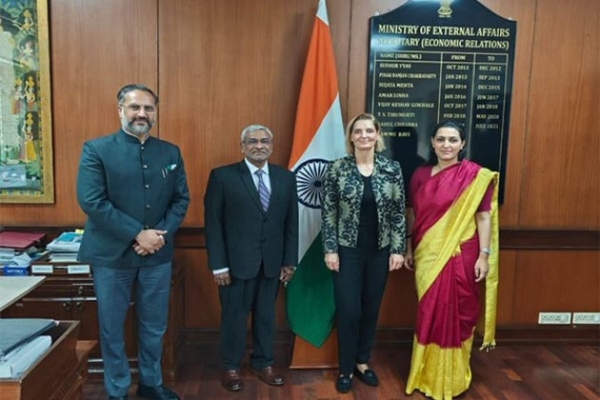MEA secy meets top World Bank official, discusses power, capacity building, and energy security

New Delhi [India], February 19 (ANI): The secretary (Economic Relations) in the Ministry of External Affairs, Dammu Ravi, met the World Bank’s Director of Regional Integration and Engagement in South Asia, Cecile Fruman, in New Delhi on Monday. The two leaders discussed wide-ranging issues, from the power sector to capacity building to energy security and disaster resilience as well. In a post on social media platform X, the spokesperson of the Ministry of External Affairs, Randhir Jaiswal, wrote, "Secy (ER) Dammu Ravi met @cfruman, Director, Regional Integration and Engagement, South Asia, @WorldBank in New Delhi today.""Discussions covered various activities of World Bank pertaining to regional integration. Issues related to the power sector, capacity building, energy security and disaster resilience were also discussed," the MEA spokesperson wrote in a post. In first week of February, Martin Raiser, a senior World Bank official lauded India for its high economic growth and modest emission, saying India’s development trajectory matters globally and its track record puts it on a much lower carbon emissions path than other major economies. Speaking at an event here, Martin Raiser, Vice President for the South Asia Region at the World Bank, emphasised the need for climate resilience as India is among the top 10 most climate-vulnerable countries. He also stressed the importance of more private investment along with public funding to address the climate issue. Raiser was speaking at the World Sustainable Development Summit organised by The Energy and Resources Institute (TERI). Emphasising that India today emits only 2.8 tons of CO2 per year, a quarter of China’s and less than half of the global average, Raiser believes the country would continue on this high growth, modest emissions path. He cited two arguments to support his argument. "First, because it’s the remains of the economy driven by low emission services, even if demand for industrial goods is likely to increase as India organizes and builds more infrastructure to serve this fast-growing economy. Second, technological progress will allow India to increasingly comfortable energy supply from carbon emissions and has already made significant inroads in the power sector" he said. Raiser also pointed out that India is the world’s fourth-largest renewables market and owns 3 per cent of the global manufacturing capabilities. "India’s development trajectory matters globally. Its track record today puts it on a much lower carbon emissions path than other major economies in the form of its climate vulnerability, deep domestic capital markets and domestic innovation capacity, which may also position it as a leader in developing and funding climate smart climate," he said. (ANI)

